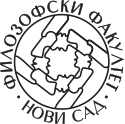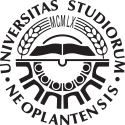15FLFL024 - Speculative Philosophy
| Course specification | ||||
|---|---|---|---|---|
| Course title | Speculative Philosophy | |||
| Acronym | 15FLFL024 | |||
| Study programme | Philosophy | |||
| Module | ||||
| Type of study | first degree undergraduate academic studies | |||
| Lecturer (for classes) | ||||
| Lecturer/Associate (for practice) | ||||
| Lecturer/Associate (for OTC) | ||||
| ESPB | 8.0 | Status | ||
| Condition | None | Oblik uslovljenosti | ||
| The goal | The course comprises the second part of the very significant epoch in the history of philosophy, which is usually marked as the Classical German Philosophy or German Idealism. It includes philosophical doctrines of Schelling and Hegel, with the addition of the thematic section which comprises one of the major philosophical reactions to Hegel’s philosophy (Marx’s philosophy). This course should enable a profound philosophical inquiry of the complex thought and conceptual-categorical nexuses, a formation of the ability for a synthesis of the previously acquired philosophical knowledge and insights, as well as the understanding of the basic streams of the modern philosophy. | |||
| The outcome | Acquiring knowledge of the basic thematic content of Schelling's and Hegel's philosophy. | |||
| Contents | ||||
| Contents of lectures | Schelling’s overcoming of Fichte’s subjective idealism; The analysis of ‘objective’; Schelling and Romanticism; Foundations of the philosophy of nature; Philosophy of nature and the analysis of self-consciousness; Philosophy of nature and transcendental philosophy; The system of the absolute identity; The problem of relation between identity and non-identity; Identity and the Absolute; Intellectual intuition; Aesthetic and absolute idealism; Philosophy and religion; The question concerning freedom; Schelling’s late philosophy; Hegel’s "Jena period’; Hegel’s attitude toward Kant, Fichte and Schelling; The idea of philosophical system in the Preface of "The Phenomenology of Spirit"; The problem of the relation between phenomenology of spirit, science of logic and the encyclopaedic system; The concept of spirit; Dialectic and speculation; The idea of philosophical system; The place of the phenomenology of spirit within the philosophical system; Science of Logic as onto-logic; Philosophy of nature; Foundations of the philosophy of spirit; Philosophy of subjective spirit; Philosophy of objective spirit; Philosophy of absolute spirit; Philosophy of the history of philosophy; Philosophy of history; Philosophy of religion; Aesthetics; Marx’s reception of Hegel’s philosophy; The concepts of human, labour and history in Marx; The idea of the negation of philosophy as its realization; Critique of Hegel’s philosophy of right; The idea of foundations trans-civil society. | |||
| Contents of exercises | Analysis of original philosophic texts. | |||
| Literature | ||||
| ||||
| Number of hours per week during the semester/trimester/year | ||||
| Lectures | Exercises | OTC | Study and Research | Other classes |
| 2 | 2 | |||
| Methods of teaching | Lecturing, dialogical method, method of textual analysis. | |||
| Knowledge score (maximum points 100) | ||||
| Pre obligations | Points | Final exam | Points | |
| Activites during lectures | 15 | Test paper | ||
| Practical lessons | Oral examination | 60 | ||
| Projects | ||||
| Colloquia | ||||
| Seminars | 25 | |||

